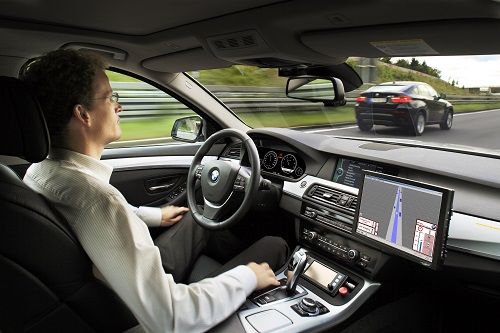Isaac Asimov was a certified genius. In 1964, the biochemistry professor and science fiction author published a prolific article, “Visit to the World’s Fair of 2014,” in the New York Times that explicated how technology would progress by 2014. During his lifetime, he published over 500 books, including both science fiction novels and nonfiction stories. As per this research, Asimov proved to be very knowledgeable about the world of tech. For this week’s Throwback Tech, let’s observe the extent to which his predictions were accurate.
Robots becoming more like humanoids?
“Much effort will be put into the designing of vehicles with 'Robot-brains'—vehicles that can be set for particular destinations and that will then proceed there without interference by the slow reflexes of a human driver.” 
Absolutely! Currently, a handful of states have considered the use of autonomous vehicles on the road. In the future, we will more than likely see luxury cars on the market with an “autopilot” function.
Nuclear batteries
“The appliances of 2014 will have no electric cords, of course, for they will be powered by long-lived batteries running on radioisotopes.”

Image via lehsys
As interesting as this may be, nuclear battery innovations have not happened yet. Asimov was correct with the development of wireless electronics like phones, tablets, and computers. Everyone still uses electric cords. This one would come with many environmental restrictions.
Robots in homes
“Gadgetry will continue to relieve mankind of tedious jobs. Kitchen units will be devised that will prepare ‘automeals,’ heating water and converting it to coffee; toasting bread; frying, poaching or scrambling eggs, grilling bacon, and so on. Breakfasts will be ‘ordered’ the night before to be ready by a specified hour the next morning.”

Even with the emergence of full-meal vending machines, this prediction is not quite accurate. We’re all still cooking, whether we like it or not. But GPS systems and computers do actually save time when completing tasks, enabling us to eliminate some of the tediousness.
The role of robots in our lives
“Robots will neither be common nor very good in 2014, but they will be in existence…. It will be such computers, much miniaturized, that will serve as the “brains” of robots. In fact, the I.B.M. building at the 2014 World’s Fair may have, as one of its prime exhibits, a robot housemaid large, clumsy, slow-moving but capable of general picking-up, arranging, cleaning and manipulation of various appliances.” 
Robots are all around, in factories, in tech plants, but not very common in our everyday lives. Outside of the robotic vacuum cleaners, we still aren’t really using robots in our houses. We still don’t have robotic maids to make the bed or do our laundry.
But with many recent robotic advancements and Google’srecent acquisition of many robotics companies, robots are inevitably “in.” We have to remember that these robots will only be as smart as we program them to be.
Earth’s journeys into outer space
“By 2014, only unmanned ships will have landed on Mars, though a manned expedition will be in the works and in the 2014 Futurama will show a model of an elaborate Martian colony.” 
Yes, unmanned spacecrafts have ventured to Mars. Living on Mars has been discussed, but cannot yet realistically be actualized.
Living underwater
“Underwater housing will have its attractions to those who like water sports, and will undoubtedly encourage the more efficient exploitation of ocean resources, both food and mineral.” 
Image via Sodahead
We have not yet mastered living like Spongebob, in a pineapple under the sea. I don’t know if this will ever come to fruition, but how cool would it be to wake up every morning with the sun’s luminescence casting tranquil shadows into your underwater home.
Video chat
“Communications will become sight-sound and you will see as well as hear the person you telephone. The screen can be used not only to see the people you call but also for studying documents and photographs and reading passages from books.”

With programs like Skype, Facetime, and iChat, we can now see the person we’re talking to, wherever their location may be. Asimov was also dead-on with his prediction of how we use the modern screen. From texts, to music, to photos, everything is digital. These “screens” encompass tablets, iDevices, and computers. Awesome.
Not living in the present because of technology
“Men will continue to withdraw from nature in order to create an environment that will suit them better. By 2014, electroluminescent panels will be in common use. Ceilings and walls will glow softly, and in a variety of colors that will change at the touch of a push button.”

Technology obviously alters our perception of the world. When humans are staring down at their glowing screens each day, they are creating an alternate reality. Gear like Google Glass allows people to “withdraw from nature,” and to be constantly “plugged in.”
Speaking of being oblivious about our environment, the head-mounted wearable HDTV by Sony includes surround sound, and has the equivalent of a personal 750-inch movie screen. WOW!
In regards to the glowing walls and ceilings, Philips has developed an LED carpet that integrates lighting into fabric. The company wants to bring this technology to public spaces, such as airports and movie theaters, to guide people towards their destinations. Home use for these LEDs is also in the works, where the lights will be controlled from a smartphone to alter the brightness, color, and ambience of the lights.
Distribution of technology around the world
“Not all the world’s population will enjoy the gadgety world of the future to the full. A larger portion than today will be deprived and although they may be better off, materially, than today, they will be further behind when compared with the advanced portions of the world. They will have moved backward, relatively.”

Image via Scientific American
Accurate. Although a large sector of the world has become technologically savvy, there are still countries that don’t yet have the means to access such electronics.
Education in binary arithmetic and coding
“The world of A.D. 2014 will have few routine jobs that cannot be done better by some machine than by any human being. Mankind will therefore have become largely a race of machine tenders. Schools will have to be oriented in this direction…. All the high-school students will be taught the fundamentals of computer technology will become proficient in binary arithmetic and will be trained to perfection in the use of the computer languages that will have developed out of those like the contemporary Fortran.”

Teaching basic coding to youngsters really isn’t a bad idea. Since this type of technology is the future, tech essentials like learning how to make an app, should be taught in school.
Test tube foods
“The 2014 fair will feature an Algae Bar at which “mock-turkey” and “pseudosteak” will be served. It won't be bad at all (if you can dig up those premium prices), but there will be considerable psychological resistance to such an innovation.”

Wow. Science. Last year, researchers created the first lab-grown hamburger. It could be yours for the mere cost of $300,000. Also 3D printers can create food, so this prediction wasn’t too far off.
Advertisement
Learn more about Electronic Products Magazine





